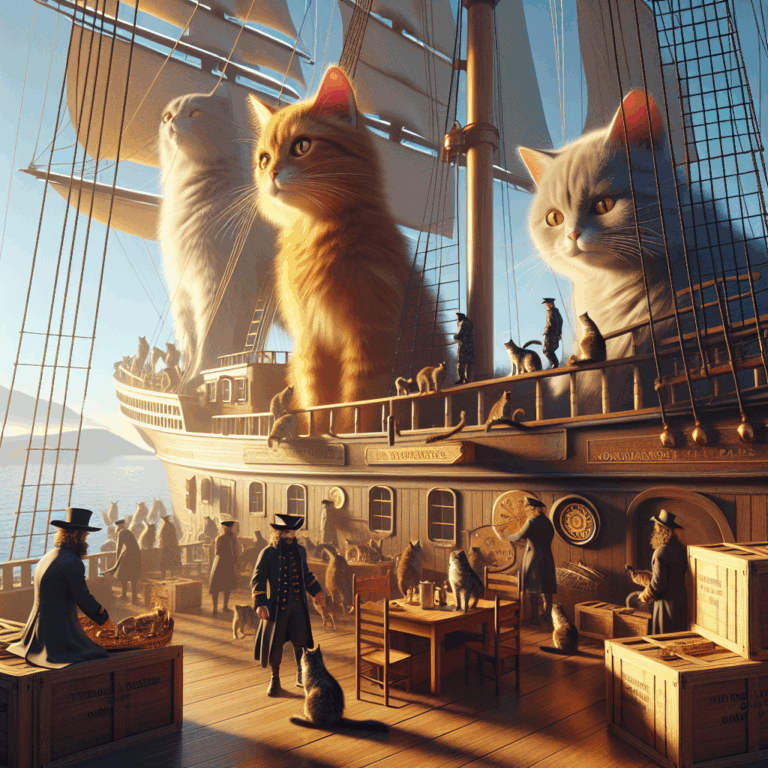The Feline Navigators: Cats and Their Unseen Impact on Maritime Adventures
- 19 Comments
In an unexpected turn of events, cats have emerged as pivotal figures in the maritime world, influencing sailing techniques and shipboard life in ways that have only recently been acknowledged. While the image of a cat aboard a ship may evoke charming scenes of these agile creatures lounging on decks or gracefully balancing along railings, their historical and ongoing contributions to maritime adventures are far more profound.
Throughout history, cats have been essential companions on voyages, and their role extended beyond simply being mascots or rodent deterrents. In the Age of Exploration, cats were considered good luck on ships, believed to bring safety and prosperity. However, their true value lay in their uncanny navigation skills. Sailors often observed cats’ behavior to predict weather changes, as these astute animals seemed to sense shifts in atmospheric conditions long before humans could. This ability allowed crews to prepare for storms or changes in wind direction, which could be crucial for survival at sea.
Moreover, cats have served as morale boosters in the often harsh and isolated environment of long voyages. Their presence provided comfort and companionship to sailors who spent months away from home. The psychological benefits of having a feline friend on board, particularly during arduous journeys, cannot be overstated. Cats offered a sense of normalcy and warmth, their playful antics providing entertainment and a much-needed distraction from the monotony and stress of ship life.
In modern times, the role of cats in maritime adventures has not diminished, although it has evolved with technological advancements. With the advent of sophisticated weather tracking and navigation systems, the practical need for cats may have lessened, but their symbolic presence endures. Many ships still maintain a ship cat as a talisman, a nod to maritime tradition and the enduring bond between sailors and their feline companions. Furthermore, the presence of cats on scientific vessels, particularly those embarking on long research expeditions, continues to provide emotional support to crew members, contributing to overall mission success.
Additionally, recent studies have shown that cats might play an indirect role in marine conservation efforts. By fostering a connection with these animals, sailors and maritime enthusiasts are often inspired to advocate for ocean health and wildlife protection, recognizing the interconnectedness of all creatures with the sea. This growing awareness has led to an increase in initiatives aimed at preserving marine habitats and ensuring the sustainability of oceanic ecosystems.
The influence of cats on maritime adventures, past and present, highlights the unique and often underestimated ways in which these creatures contribute to human endeavors. As we continue to explore the vastness of the ocean, it is clear that cats will remain steadfast companions, guiding us through both calm seas and turbulent waters with their quiet grace and unyielding spirit. Whether as navigators, comforters, or conservation advocates, the legacy of cats in the maritime world is sure to sail into the future, charting new courses for both man and feline alike.

In an unexpected turn of events, cats have emerged as pivotal figures in the maritime world, influencing sailing techniques and shipboard life in ways that have only recently been acknowledged. While the image of a cat aboard a ship may evoke charming scenes of these agile creatures lounging on decks or gracefully balancing along railings, their historical and ongoing contributions to maritime adventures are far more profound.
Throughout history, cats have been essential companions on voyages, and their role extended beyond simply being mascots or rodent deterrents. In the Age of Exploration, cats were considered good luck on ships, believed to bring safety and prosperity. However, their true value lay in their uncanny navigation skills. Sailors often observed cats’ behavior to predict weather changes, as these astute animals seemed to sense shifts in atmospheric conditions long before humans could. This ability allowed crews to prepare for storms or changes in wind direction, which could be crucial for survival at sea.
Moreover, cats have served as morale boosters in the often harsh and isolated environment of long voyages. Their presence provided comfort and companionship to sailors who spent months away from home. The psychological benefits of having a feline friend on board, particularly during arduous journeys, cannot be overstated. Cats offered a sense of normalcy and warmth, their playful antics providing entertainment and a much-needed distraction from the monotony and stress of ship life.
In modern times, the role of cats in maritime adventures has not diminished, although it has evolved with technological advancements. With the advent of sophisticated weather tracking and navigation systems, the practical need for cats may have lessened, but their symbolic presence endures. Many ships still maintain a ship cat as a talisman, a nod to maritime tradition and the enduring bond between sailors and their feline companions. Furthermore, the presence of cats on scientific vessels, particularly those embarking on long research expeditions, continues to provide emotional support to crew members, contributing to overall mission success.
Additionally, recent studies have shown that cats might play an indirect role in marine conservation efforts. By fostering a connection with these animals, sailors and maritime enthusiasts are often inspired to advocate for ocean health and wildlife protection, recognizing the interconnectedness of all creatures with the sea. This growing awareness has led to an increase in initiatives aimed at preserving marine habitats and ensuring the sustainability of oceanic ecosystems.
The influence of cats on maritime adventures, past and present, highlights the unique and often underestimated ways in which these creatures contribute to human endeavors. As we continue to explore the vastness of the ocean, it is clear that cats will remain steadfast companions, guiding us through both calm seas and turbulent waters with their quiet grace and unyielding spirit. Whether as navigators, comforters, or conservation advocates, the legacy of cats in the maritime world is sure to sail into the future, charting new courses for both man and feline alike.



19 thoughts on “The Feline Navigators: Cats and Their Unseen Impact on Maritime Adventures”
This insightful post highlights the fascinating role of cats in maritime history and their ongoing connection with sailors and the sea.
It’s great to see appreciation for the unique role cats have played in maritime history. Their contributions truly go beyond the surface, adding both practical and emotional value to seafaring life.
Pingback: levné kamagra sobotní doručení
Pingback: buy xifaxan canada suppliers
Pingback: purchase rifaximin non prescription online
Pingback: purchase avodart uk over the counter
Pingback: staxyn for sale canada
Pingback: order itraconazole cheap usa
Pingback: buy cheap gabapentin uk pharmacy
Pingback: purchase fildena price uk
Pingback: cheapest buy flexeril cyclobenzaprine canada low cost
Pingback: cheapest buy dutasteride toronto canada
Pingback: buy androxal generic dosage
Pingback: medicament kamagra france prix
Pingback: discount enclomiphene
This insightful post sheds light on the fascinating and enduring bond between cats and sailors throughout maritime history.
What a fascinating exploration of the important role cats have played in maritime history and their ongoing connection to sailors and the sea!
It’s great to see the appreciation for the unique bond between cats and maritime adventures. Their contributions have certainly added a rich layer to the history of sailing.
It’s wonderful to acknowledge the special connection between cats and the maritime world. Their role truly enriches the history and spirit of sailing.